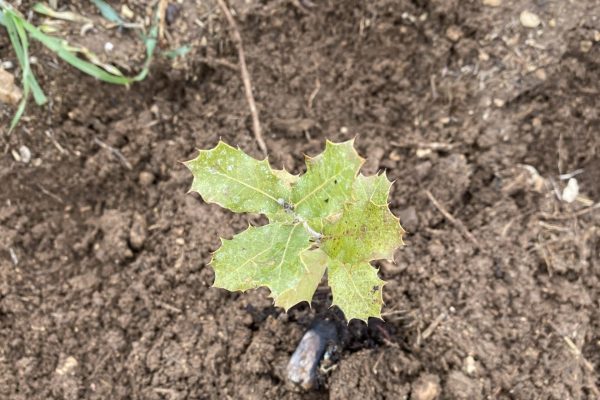With each of the sons of Jacob was born a twin sister. —Rashi
On Tisha B’Av twelve ancestor-sisters gather to weep. On other days it is only the One-who-Mourns who weeps over the sorrows of the world, but on this day, the day the Temple was destroyed, they all gather on the Mount of Olives to remember the razing of Jerusalem and the suffering of exiles all over the world.
Nisan was born first, but she is the youngest. She wears innocence in a locket — a gift from her Mother — but she is no innocent. Her girlish heart breaks open for children who cannot learn their language because the conqueror forbids it, who do not own their land because it was stolen from them. She weeps for child slaves, child prostitutes, girls who cannot read, infant brides, boys who cannot expect a future.
The second of the sisters is Iyar, the midwife, her thick hair piled in a wrap so it is out of the way while she heals the wounds of the world. This day she weeps for the stillborn babes and the listless toddlers, the folk with cholera and hepatitis, the amputees, the mothers in ambulances that cannot reach the hospital. She weeps for the toll taken by poverty and war.
Sivan is the prophetess, with a long braid, strong fingers, and a drum. She is the gadfly of the world, awakening the rhythms of change. She weeps for all the prophet-folk slain as they work for justice: the nuns of South America, the peacekeepers, the Gandhis and Kings, the Joans-of-Arc, the demonstrators and the women in black. She speaks forth poems and hymns, raising a lament for those who raised their voices and gave their lives. She mourns also for those who prophesy and are not heeded.
Mother Tammuz lifts her immense breast from the mouth of the world for a moment, so she can remember all the mothers like her, all those who have no bed to lay their children down and no food to feed their little ones. Mother Tammuz lets her tears roll down for the mothers who lose their children to prisons and interrogations, and the mothers who have to leave their children to earn bread. Mother Tammuz wants peace, and enough soup to go around.
Av is the wisest of them all. She is large-boned like the ancient mountains. She carves traditions as if from wood. Tonight her gaze is sad and thoughtful. She mourns the ones with faults that led to tragedy: carelessness, timidity, pettiness, faulty knowledge, inattention at the wrong moment. She mourns the priests and prophets who let Jerusalem burn because they were feuding with one another. She knows they do not sleep well — in this world or any other.
The sixth sister, Elul, is the keeper of the altars and the sacred fires, everywhere on earth. She spills her bright red curls on the sacred stones of the holy places of the world, weeping for all the holy places defaced and destroyed by zealots. She weeps for the clergy of the fields and trees, deposed by the conquerors. She weeps for the lost, bent, distorted traditions of traumatized people. She weeps for the stones of the Temple.
Tishrei is the warrior-queen, crowned and in armor. On most days she rides forth to the battle between self-delusion and self-reflection. She takes her stand within the human heart. Today, she is mourning those who lost the battle and succumbed to narcissism and wrong deeds. They too need to be mourned, and she is perhaps the only one with the fortitude to do it. She knows she too could do evil, if she let herself. She remembers this always.
Marcheshvan is She who Mourns. Today is her day, the day when all turn their attention to the work of grieving. She takes only a little comfort in this. Today she mourns that tomorrow the world will turn its attention away again. She will be left alone to witness the forgotten ones of the world. She rubs her red eyes and looks toward the horizon. If the Messiah ever comes, she is the one who will notice first.
The shamaness with dreadlocks and ragged cloak, that is Kislev, the ninth sister. On Tisha B’Av, she mourns for the magic — all the lost faith that happens when one is surrounded by callousness and cruelty. She opens the book of signs and symbols and points, knowing only a few of the exiles will look back. She is willing to be a teacher, if only a student will appear among the refugees. She believes in the power of re-invention.
Tevet’s head is shaved and she holds a begging bowl. She is the seeker and has walked barefoot for millennia on the roads that lead from one country to the next. She grieves for those whose hearts are broken, who cannot accept, who cannot mourn, who cannot let go, who cannot hold another ounce of pain. She offers to hear the pain, to absorb the blows, to help peace enter.
Shevat is the One Who Loves. Full-hipped and wide-mouthed, she walks among the people, sowing the seeds of love, shaking the earth, bringing change to societies and hope to whole generations, for love conquers all. On this day she is mourning for all lovers separated by war: soldiers away from their families; partners torn apart because of religion, family, or nationality; lovers unfairly divided by death. She mourns whenever there is hatred on earth.
The laughing one, Adar, stands aside telling jokes. The other sisters are angry with her, but she means no disrespect. This is Adar’s way of mourning. She laughs till she cries, using her humor to lift the spirits of all who are sad. She works to bring life back to bodies and souls that have lost their vital spark. No one can turn aside the Fool’s healing breeze. She lopes into the desert or the refugee camp, and that place is never the same. Adar was born last, but she is Eldest.
On Tisha B’Av the twelve ancestor-sisters gather to weep, and the One-who-Mourns leads them in lamentation. The Weaver their Mother does not weep. Serenely she goes on working the threads of time across the loom, adding another color, another pattern. She is the Temple, falling and being rebuilt. She is life in its frail frantic majesty. She is so beautiful that the weeping ones rejoice in her even as they mourn for all the sorrows of the world.
Read the sequel to this story, the Dance of the Twelve Sisters: A Tu B’Av Story, written for the full moon festival of Tu B’Av, a love and dancing holiday that comes six days after Tisha B’Av, the anniversary of the Temple’s destruction.











